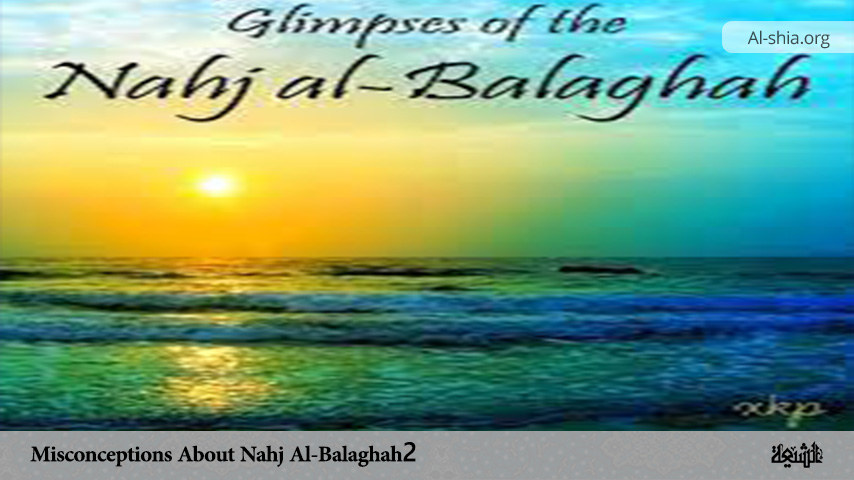In continuation of the discussions on the topic titled “Misconceptions About Nahj Al-Balaghah”, we shall focus on other relevant issues on the topic here.
This khutbah (Sermon) ends with the following words
Then you would have found that your world is more insignificant in my eyes than a goat’s snot. At this point, ‘Ali’s speech was interrupted by a man from Kufah. Ibn al-‘Abbas, after narrating the text of the speech, adds: I have never regretted anything nor felt such distress like the distress l felt at losing the rest of the speech of the Commander of the Faithful, peace be on him. When he finished reading the letter, I said: “Commander of the Faithful would you continue your speech from the point which you reached?” He answered: “In no way, in no way. It was like foam on the camel’s mouth (Shiqshiqah) as it opens its mouth to bellow and then falls silent.”
Apart from al-‘Irshad this khutbah, as claimed by ‘Arshi, is found in other sources also. In no way can it be dubbed as al-Radi’s or al-Murtada’s fabrication. Sayyid Hibat al-Din al-Shahristani, in Mahuwa Nahj al-balaghah, has quoted different versions of al-Khutbat al-Shiqshiqiyyah from Nathral-Durar wa Nuzhat al-‘Adab by the vizier Abu Sa’id al-‘Abi; al-‘Irshad by al- Shaykh ai-Mufid; al-Mahasin wa al-‘Adab by al-Barqi; al-Saduq in Ila’l al-Sharayi’; and a book of al-Jalludi. All the versions have minor differences, which indicate that the source from which al-Radhi quoted this sermon was other than these four. After enumerating the earlier works containing this khutbah, Hibat al-Din al- Shahristani points out that Ibn ‘Abd Rabbih, one of the compilers of al-Khutbat al-Shiqshiqiyyah, was a follower of the Banu Umayyah and a staunch admirer of the third caliph ‘Uthman ibn writes: ‘Affan.
Much earlier than Ibn Khallikan made his remark questioning the authenticity of the attribution of Nahj al- balaghah, certain doubts had come to circulate as indicated by Ibn Abi al-Hadid al-Mu’tazili (d. 555/1257), who referred to a discussion concerning the attribution of al-Khutbat al- Shiqshiqiyyah with his teacher Abu al-Khayr Musaddiq ibn Shabib [sic. Shayb] al-Wasiti (d. 605/1208), who said: I read this khutbah in the presence of Abu Muhammad ‘Abd Allah ibn Ahmad, known as Ibn al-Khashshab (493 -567/1099-1172)… and asked him if he considered this khutbah to be a forged one and not of ‘Ali (as). Ibn al-Khashshab said:
By God, I am convinced that it is from ‘Ali and I am as sure of it as I am convened of your truthfulness.
Al-Wasiti said to Ibn al-Khashshab: “A group is of the view that this khutbah was fabricated by al-Radhi, may God be pleased with him.” Ibn al-Khashshab said: Is it not beyond the eloquence of al-Radhi or any other? How could he speak from such a high level of spirituality in such a (forceful) style? We are well acquainted with al-Radi’s writings, his style and his technique. I have assessed both his poetry and prose, these words as compared to those of al- Radi are so different that there is no question of confusing them with his writings.”
He further said: By God, I have read this sermon in books written two hundred years before the birth of al-Radhi. Yes, of course, I have seen it written in many books. I can identify this khutbah very well and know that which of the ‘ulama’ and men of letters quoted it (in his work) much before al-Radi’s father was born.”(1)
On another occasion, in his Sharh Nahj al-balaghah, Ibn Abi al-Hadid
A group of blind followers of their own whims and wishes is of the opinion that the best part of Nahj al-Balagha is fabricated and forged by a group of Shi’i writers and is something new. Most of them consider a part of it to be the product of al-Radi’s pen or of others. But this group consists of prejudiced people, whose heart’s vision is blocked by partiality and who have deviated from the right and straight path of truth; they have strayed from the truth due to perversion, lack of knowledge, and unfamiliarity with literature and poetry. (2) At another place he writes about the words of Amir al-Mu’minin (as):
His eloquence is such that he is the leader of the eloquent and the guide and master of orators. It is said about his utterances that his words are below the Word of the Creator only, but over and above the words of all creatures, and from him, the world has learnt the art of speech and rhetoric. There were people in the age of al-Radhi himself whose hearts and eyes were sealed in such a manner that they attributed some of ‘Ali’s utterances to Mu’fiwiyah. Al-Radhi’s commentary on the following khutbah, is important: His comment, are as follows:
People with no ability to understand literature ascribe it to Mu’awiyah whereas these are undoubtedly the words of Amir al- Mu’minin. How can dirt compare with pure gold?… ‘Amr ibn Bahr al Jahiz, a critic gifted with insight and a distinct sensibility, has probed the matter minutely. He has included this khutbah in al-Bayan wa al-Tabyin and has mentioned those who attributed it to Mu’awiyah. Subsequently, he says: “This speech is very much like the speeches of ‘Ali (as) and is in conformity with the great man’s classification of people, and it also corresponds with his manner of depicting the people’s modes of behaving in anger, under oppression and waywardness, and in the state of dissimulation and fear.
Continued in the next article: ( Misconceptions About Nahj al Balaghah 3 )
NOTES:
________________________________
1. Sharh Nahj al-balaghah, vol. 1
2. Vol. 1, p. 543.

















